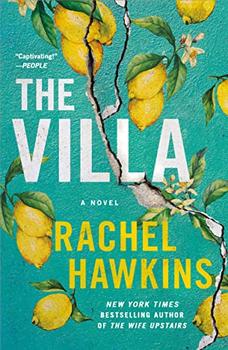Book Club Discussion Questions
In a book club? Subscribe to our Book Club Newsletter!
For supplemental discussion material see our Beyond the Book article, Female Frenemies in Literature and Reality and our BookBrowse Review of The Villa.
Please be aware that this discussion guide will contain spoilers!
-
This novel alternates between time lines and perspectives, and includes articles, podcast transcripts, song lyrics, and book excerpts. How did the structure of the novel affect your reading experience and/or help to build suspense?
-
Discuss the evolution of Mari and Lara's relationship, alongside that of Emily and Chess. What role did men play in their sense of competition with each other? How did their dynamic shift after the men were out of their lives?
-
How did Pierce's death affect each of the characters in the 1970s story line?
-
How did Matt's desire for control over Emily manifest? Compare and contrast the ways in which the topic of having children or the loss of a child affected Emily and Matt, as well as Mari, Lara, and Pierce.
-
"It was hard for two people to be artists when the rugs needed hoovering, and food needed to be purchased, dishes washed. And somehow, those things kept falling on her." (Page 27) How did Mari's romantic life interfere with her writing? In the dynamic of Pierce and Mari's relationship, why was his music always prioritized over her writing? Additionally, how do Pierce and Noel react when Lara tells them she's written some songs she'd like to share? (Page 68)
-
Though Mari and Lara were initially expected to be nothing more than Noel's
and Pierce's muses and companions, they were the ones to create groundbreaking art that summer. In defying expectations, what did they prove,
who did they prove it to, and should they have had to prove anything at all? Do women today still have to "prove" themselves in certain spaces?
-
Discuss why Mari rewrote the ending of her and Pierce's story. How does Mari's altered narrative influence Emily's life?
-
When Mari considers how her letters might be read after she has died, she acknowledges that "[s]he's done what she can, reclaimed the narrative for herself in a way that makes sense to her, and if it means the world one day believes she murdered Pierce, at least it ensures no one will ever separate them again." (Page 276) What does this say about the legacies we leave behind and our inability to control whether our art is interpreted as we intended? What do you think the novel suggests about fate and letting things happen as the universe means for them to?
-
The first line of Lilith Rising reads: "Houses remember." In the Peoplemagazine clip on page 254, a local resident says of Villa Aestas, "The house is just cursed." Do you think there's truth to either statement? Can places hold memories?
-
Hawkins drew inspiration from the summer of 1816, when Percy and Mary Shelley stayed at a villa on Lake Geneva with Lord Byron. What parallels do you see between the 1970s story line and this moment in literary history?
-
Why do you think characters in each time period expected to find inspiration
while they stayed at the villa? How do Lara's album Aestas and Mari's Lilith Rising make the villa a main character within this story?
-
. Emily and Chess's book is part true crime/nonfiction, part memoir about their
time at the Villa Aestas, and part literary mystery. How do you imagine that Emily and Chess's The Villa differs from iThe Villa that you read? In what ways does the title emphasize how there's always a story within a story, and that the person telling the story is integral to how a story is told?
Unless otherwise stated, this discussion guide is reprinted with the permission of St. Martin's Griffin.
Any page references refer to a USA edition of the book, usually the trade paperback version, and may vary in other editions.
